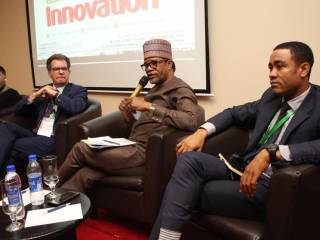Executive Vice Chairman and Chief Executive of the Commission, Prof. Umar Garba Danbatta, who stated this in a keynote address at the fourth edition of the Nigeria Innovation Summit (NIS) with the theme: "Accelerating Nigeria’s Economic Growth through Innovation” also enumerated policy initiatives the NCC has been implementing towards bridging identified infrastructure gap in the telecom industry.
Represented by the Director, Research and Development, NCC, Ephraim Nwokenneya at the event, Danbatta said without robust policy initiative to improve broadband infrastructure, it is difficult for individuals, businesses and governments to run any digital innovation in the financial services, education, agriculture, commerce, healthcare and other sectors of the economy.
He acknowledged that the theme of the event could not have come at a better time when advancement in the Information and Communication Technology (ICT) is, on a daily basis, throwing up innovative technologies that organisations and businesses must leverage in order to remain relevant and be competitive in their sphere of operations.
Citing an Accenture Technology Vision 2019 survey of more than 6,600 business and Information Technology (IT) executives, the EVC said that 94 percent of respondents in the survey said the pace of technology innovation in their organisations had either accelerated or significantly accelerated over the past three years, indicative of the strategic imperatives of digital technology for every individual, business and organisation.
While intimating the gathering of stakeholders on what the NCC has been doing as the regulatory agency driving digital transformation with regards to investment drive in telecommunications/broadband infrastructure, Danbatta said NCC has been working tirelessly to create an enabling environment for competition among operators and other licensees in the industry as well as ensuring the provision of qualitative and efficient telecommunications services throughout the country.
"No doubt, we have infrastructure gap/deficit in our telecom sector and to bridge this gap, the Commission has licensed six infrastructure companies (INFRACOs), one each in the six geo-political zones of the country with the seventh one specifically issued for Lagos zone because of its commercial centrality to the country.
"So far, six of the licences have been issued with the seventh one for the North-Central region being processed by the Commission. This will later be backed up with the disbursement of subsidies to each of the INFRACO licensees upon attainment of deployment milestone in their respective regions."
He further stated that the Commission is also partnering with necessary stakeholders across the three levels of government to collectively address all the challenges such as vandalism, multiple taxation and regulation, high cost of Right of Way (RoW), among others, which are impeding speedy infrastructure deployment across the country.
"For innovation to thrive towards accelerating economic growth, robust telecoms/broadband infrastructure upon which ICT innovations will ride, is a necessity. It may, therefore, interest you to know that, through effective regulatory efforts, the NCC has been able to deepen connectivity in the country. As at June, 2019, Internet connections in the country have reached over 122 million, with over 63.5 million of this figure connected to broadband networks of 3G and 4G, which represents a 33.31 percent broadband penetration," Danbatta stated.
He explained that the need to drive digital innovations informed the establishment of the NCC's Research and Development Department in 2016 which has, so far, led to the disbursement of millions of Naira, in grants, to sponsor innovation-oriented research projects in tertiary institutions and other research institutes.
"Another area where NCC has been playing a pivotal role in promoting investment opportunities and innovation within the digital ecosystem for economic growth is in exposing young Small and Medium Enterprisers (SME) owners in the ICT industry to global investment opportunities. This is done annually through sponsoring young Nigerian innovators to such global forum as the International Telecommunication Union (ITU) Telecoms World principally to provide them with the platform to exhibit relevant, home-grown technology innovations and solutions to the global investment community," he said.
The NCC EVC said that given their collective prioritisation of digital technology, what will be paramount, going forward, will be the innovative ways by which new and emerging technologies such as Artificial Intelligence (AI), augmented reality, robotics, Cloud computing, Big data, Over-the-Top (OTT), Block-chain technology, advanced security systems and and so on, are deployed by companies looking for the next competitive edge to drive innovative products and services for the consumers.
Danbatta, therefore, averred that the theme of the event could not have come at a better time when advancement in ICT, on a daily basis, is throwing up innovative technologies that organisations and businesses must leverage in order to remain relevant and be competitive in their sphere of operations," he said.

